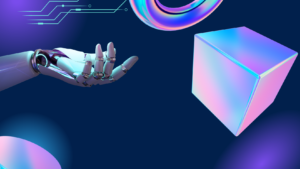
AI has dominated technology headlines and become crucial for business transformation. However, accelerated digital adoption brings challenges like ethics, bias, transparency, trust, and privacy. Blockchain and AI could potentially enable and empower each other, enhancing customer experience and offering various use cases.
Blockchain, a distributed digital ledger, stores any data without a single governing entity, ensuring robust security and authenticity since changes are noticeable. Popular for financial transactions and cryptocurrencies, blockchain also applies to asset transfers, smart contracts, supply chain monitoring, voting, and more.
In essence, key features of Blockchain are:
- Immutability
- Accuracy of transactions
- Speed of transactions
- Enhanced security
- Transparency – No intermediaries
Meanwhile, AI, particularly Generative AI, has surged in the last three years, leveraging vast computer networks and data to mimic human decision-making with precision, speed, and automation. AI faces challenges like ethical decisions and bias as it is dependent on training data. Despite this, businesses are rapidly adopting AI to streamline processes, workflows, and product offerings to avoid being digitally disrupted.
Disruptive technologies bring challenges and risks. AI fraud and deepfakes, especially concerning banks are growing issues. A study conducted by Censuswide across the UK, US and Spain found that 76% of banks reported sophisticated fraud cases, with 30% of transactions potentially fraudulent. SEON (fraud prevention and cyber security specialist) highlighted that 87% of industry experts predict the rise of –
- Artificial Intelligence (AI) playing a primary role in driving this trend
- The emergence of Fraud-as-a-Service (FaaS)
- The demand for fast, frictionless transactions and
- Growing economic pressures.
Thus, banks face the constant challenge of detecting and preventing fraudulent activities.
Of course, the solution could very well be in the problem where automating fraud detection through AI and ML can act as a preventive measure. That very well may be. But let’s look at how blockchain technology can enable banks to enhance their fraud detection capabilities with added security.
Blockchain technology offers a solution with its immutable, transparent transaction records. Banks can create secure, tamper-proof ledgers of financial transactions, where changes require network consensus.
Similarly with smart contracts, when incorporated, banks (or any other type of business for that matter) can automate processes and prevent fraudulent activities in loans and insurance claims, tracked by AI algorithms for unusual behavior.
For fraud detection, immutability is very useful. Banks can leverage blockchain to track an audit trail of transactions and validate and verify the authenticity of the parties involved, ensuring that the terms and conditions are met before executing any transaction, making it easier to track suspicious activities. Thus, any manipulation would be immediately spotted reducing fraud risk.
Beyond banking, AI and blockchain complement each other in various industries. In supply chain management, AI optimizes processes with predictive insights, while blockchain ensures transparency and traceability, reducing fraud and improving accountability.
In digital marketing, AI optimizes ad targeting and content generation based on user behavior, while blockchain ensures transparency and trust, mitigating ad fraud and improving ROI.
In Healthcare, AI-powered medical diagnostics and personalized treatments can be securely recorded on Blockchain, ensuring patient data integrity and enabling interoperability among healthcare providers while maintaining privacy.
In Intellectual property protection, AI can assist in identifying copyright infringements and monitoring digital content while Blockchain can establish immutable records of ownership and transactions enhancing IP protection and reducing piracy.
Identity verification benefits from AI-enhanced processes and blockchain’s secure, decentralized platform for storing verified identities, reducing theft and fraud.
In legal agreements, AI analyzes and interprets documents, while blockchain securely executes and enforces smart contracts, automating agreements and reducing disputes.
In summary, AI and blockchain convergence offers promising innovation and transformation across industries. Leveraging both technologies, businesses can navigate challenges, enhance security, and ensure trust and transparency. Organizations integrating these technologies can face new challenges and unlock opportunities, staying resilient in an evolving digital landscape. At Infosys DX, we offer an agnostic, cross-industry perspective to help businesses create reliable, sustainable ecosystems for their customers. As dynamic and fast technology is evolving, our core principle remains a constant, the journey to address any business challenge starts and ends with the customer. It’s never monolithic or one size fits all solution.
Infosys DX empowered with our Infosys Topaz (our proprietary AI-first set of services, solutions and platforms) can help amplify the potential of humans, enterprises and communities to create value from innovations, efficiencies and connected ecosystems.








